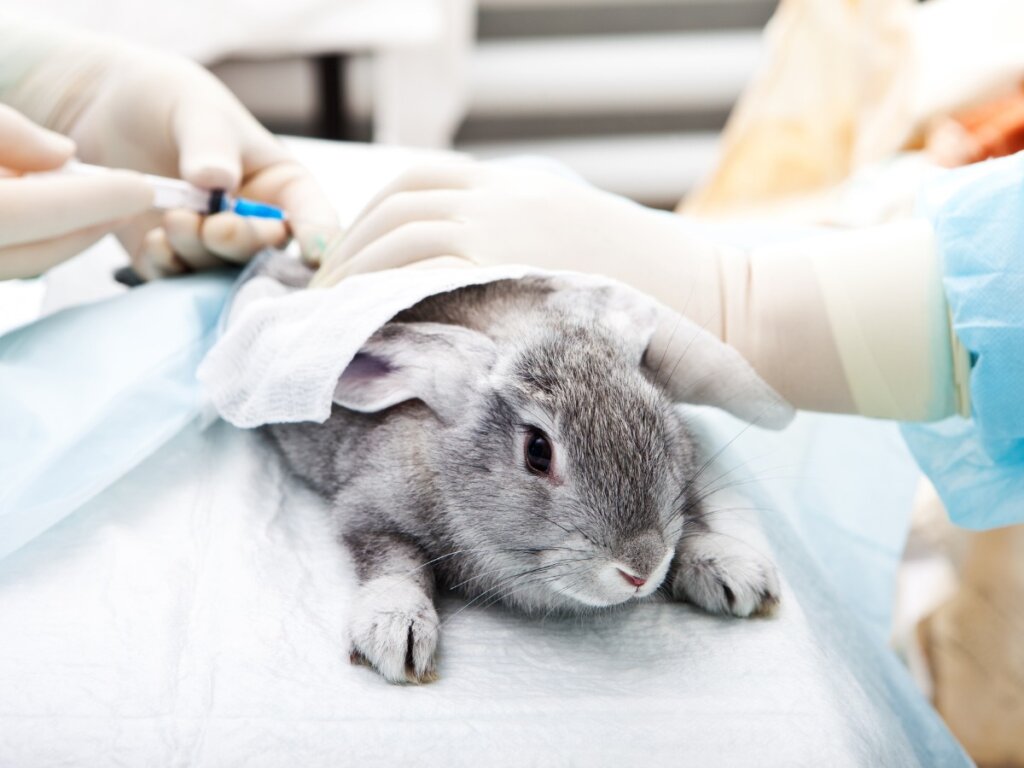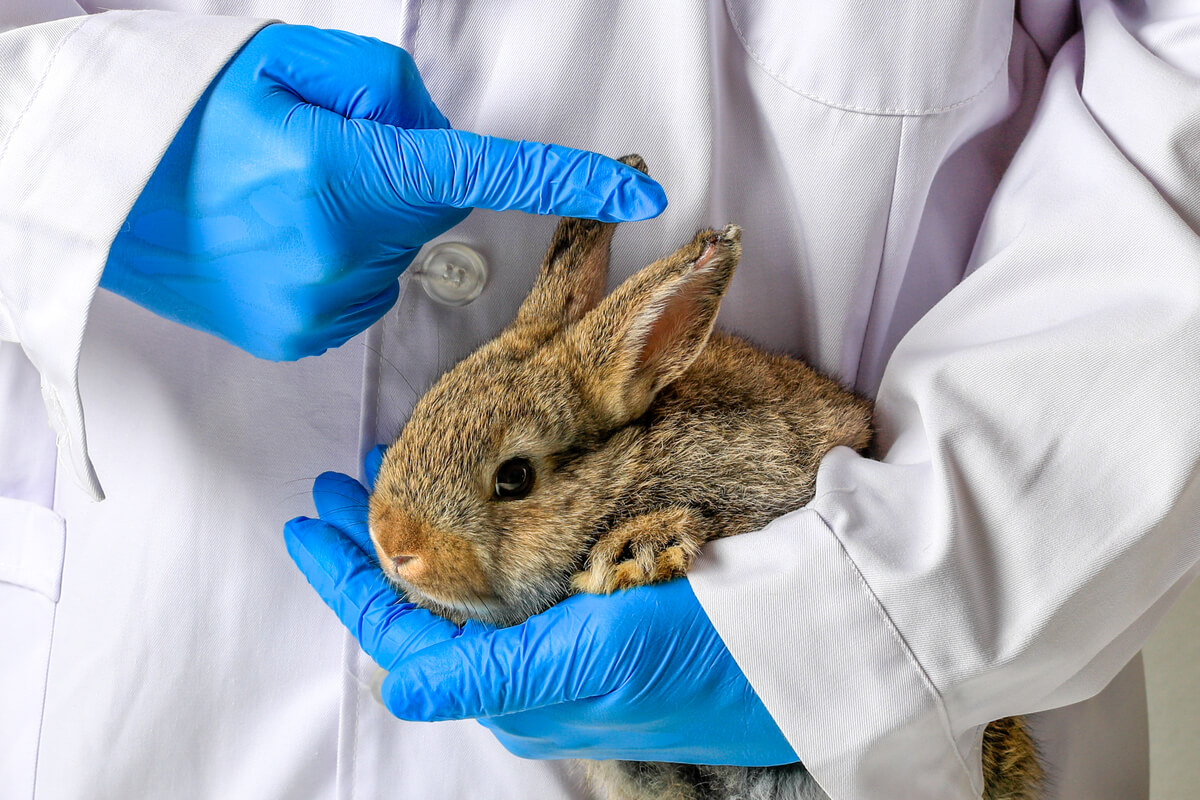Ivermectin for Rabbits: Everything You Need to Know

If your rabbits have been prescribed ivermectin, it’s normal for you to have certain questions: what it’s used for, how it works, and what the side effects are. Therefore, in this article, we’re going to tell you everything you need to know about ivermectin for rabbits.
Before continuing, it’s important that you know that you should never self-medicate your pets. If you suspect that your rabbits may be suffering from any of the diseases or conditions that ivermectin fights, then don’t rule out veterinary consultation. Only with professional help will you know the precise doses for your animals and when to take them.
What is ivermectin for rabbits?
As indicated by veterinary articles, ivermectin is a broad-spectrum antiparasitic, which is used not only in the treatment of rabbits, but of several other species. It’s considered an endectoparasiticide, since there are several microorganisms that it fights, both external and internal.
Due to this general action, this drug is included in the group of broad-spectrum macrocyclic lactones. Its mechanism of action is based on blocking the transmission of nerve impulses from parasites, causing paralysis that leads to death.
Among the advantages of this drug, one of the most notable ones is that it acts quickly, between 24 to 48 hours after application, and that it has a good range of action. This means that, after injecting it, the product remains impregnated in the skin of the rabbits and continues to attack the parasites for a considerable time.

What’s this medicine for?
Ivermectin for rabbits has several uses, but all are focused on eliminating parasites and the conditions they cause. The main application, due to the susceptibility of rabbits to suffer from it, is the treatment of scabies, which is caused by the parasites Sarcoptes scabei and Psoroptes communis.
This disease affects the skin and causes itching. These mites spread between animals quickly and can cause serious infestations in a very short time in farm-type facilities.
There are two types of scabies, sarcoptic and psoroptic. The first is the most dangerous. In addition to these parasites, this drug also fights others, such as the following:
- Cheyletiella parasotivorax – A mite that causes highly contagious dermatitis.
- Psoroptes cuniculi: Another mite that causes ear scabies.
- Baylisascaris procyonis – A type of nematode that causes encephalitis.
- Haemodipsus ventricosus (or lice): These small invertebrates can cause anemia, itching, weight loss, and hair loss.
You must bear in mind that, although ivermectin for rabbits has a wide range of action, eradicating these parasites isn’t always easy and can take several months. This medicine acts on the mites that inhabit the animal, but not on the eggs that may remain in the spaces and cracks of the animal’s cage.
This is the reason why it’s important not to mindlessly self-medicate the pet. If you suspect that your rabbits have parasites, take them to see the vet, so that they can verify the diagnosis and formulate the precise treatment.
It may be normal for other medications to be formulated and aseptic alternatives recommended for the areas where your animals live.
Dosage for rabbits
Ivermectin for rabbits is usually administered in exact doses, depending on the parasite that afflicts them. Its general presentation is in the form of a subcutaneous injection, hence the need for a professional to administer it.
In the case of scabies, articles state that, to combat it, between 0.2 and 0.4 milligrams should be injected for each kilogram of the animal’s weight. The administration period and the number of doses will be determined only by the veterinarian.
In some regions, ivermectin is available in a spot-on format, which is much easier to administer, but requires equal care.
Contraindications of ivermectin for rabbits
The main contraindication of ivermectin is the administration in rabbits that have had adverse reactions to this drug. Likewise, its use should be avoided in pregnant or lactating rabbits, as it could affect the development of the offspring.
Side effects
Ivermectin has been used safely in rabbits and different species for a long time. It isn’t common for serious side effects to be reported, but they can’t be ruled out. The main cause of them is an overdose or application of inappropriate doses.
Research indicates that side effects include ataxia, tremors, bradycardia, depression and muscle twitching, among others. The possible signology will vary according to the animal it’s administered to.
In the specific case of male rabbits, this same study indicates that there’s evidence that the sexual organs of those who are treated with this drug on a regular basis could decrease in size. This should not be of concern to guardians, but it should be taken into account.

Although ivermectin for rabbits is safe, the recommendation will always be to seek veterinary attention for any abnormality in our pets. If your rabbits have any signs of scabies or a condition from any type of parasite, see your vet. You should also be aware of any reaction that you consider abnormal after the application of this medication.
All cited sources were thoroughly reviewed by our team to ensure their quality, reliability, currency, and validity. The bibliography of this article was considered reliable and of academic or scientific accuracy.
- Paradis, M. Ivermectina en pequeños animales – dermatología y aplicaciones adicionales. Agrovet Market Animal Health. Extraido de The Compendium ol. 20 No. 4 abril de 1998.
- McKellar, Q. A. Propiedades de la ivermectina en los conejos y cobayos. Boletín de Cunicultura, ISSN 0210-1998, Núm. 60, 1992, págs. 42-43.
- González-Canga, Aránzazu, & Fernández-Martínez, Nélida, & Sahagún-Prieto, Ana, & García-Vieitez, Juan, & Díez Liébana, María José, & Tamame-Martín, Pedro Pablo, & Sierra-Vega, Matilde (2010). Seguridad de la ivermectina: toxicidad y reacciones adversas en diversas especies de mamíferos. Revista MVZ Córdoba, 15(2),2127-2135.[fecha de Consulta 23 de Julio de 2021]. ISSN: 0122-0268. Disponible en: https://www.redalyc.org/articulo.oa?id=69315067013
